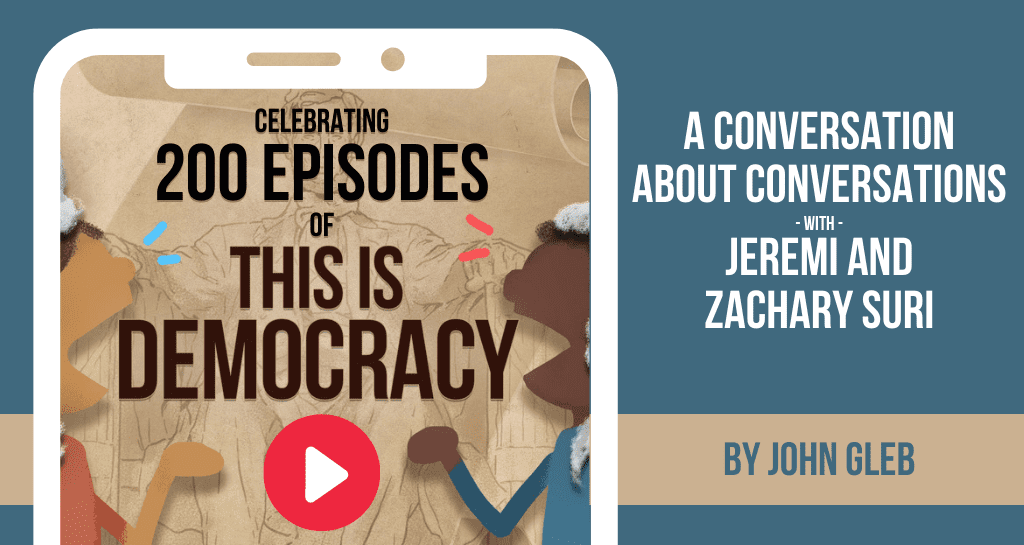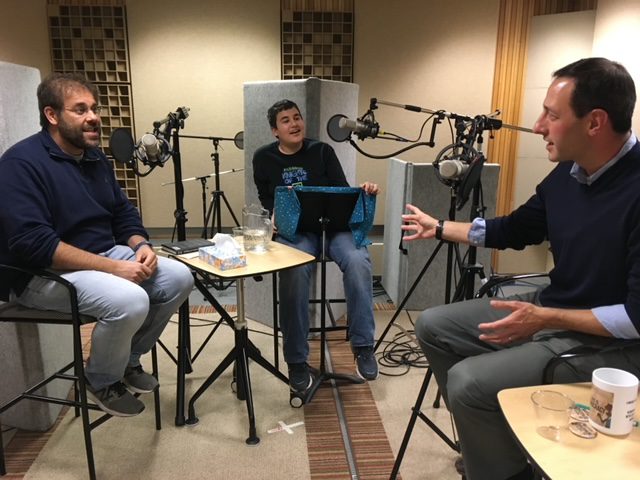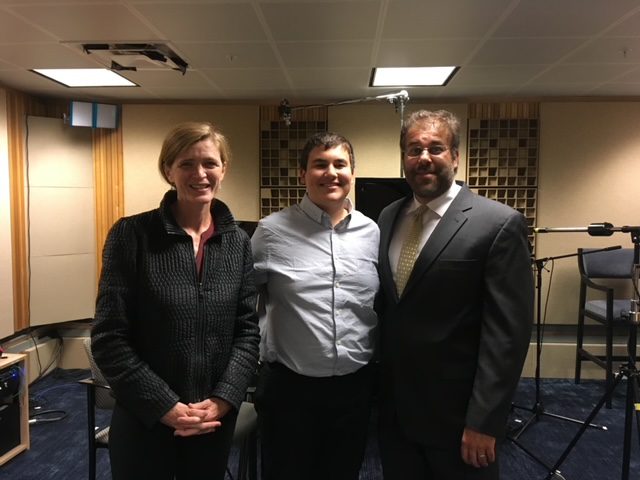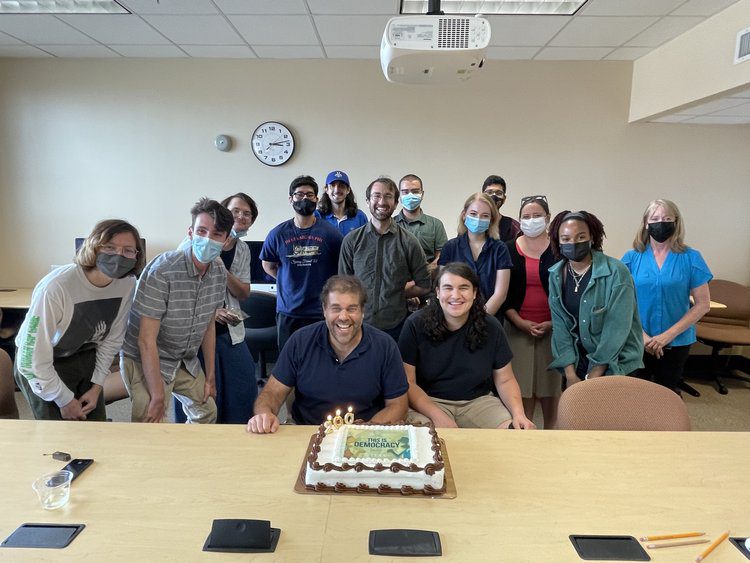
By John Gleb
Jeremi Suri is worried about the way Americans talk about politics. “There’s something missing,” he tells me. “We have voices and words being thrown around, but it’s not democracy.” Suri and I are discussing This Is Democracy, the immensely popular podcast he produces in collaboration with Liberal Arts Instructional Technology Services (LAITS). The occasion is a landmark event in the podcast’s history: This Is Democracy has just recorded its 200th episode.
Suri is the Mack Brown Distinguished Chair for Global Leadership, History, and Public Policy at the University of Texas at Austin. He’s also the author of a new book, entitled Civil War by Other Means: America’s Long and Unfinished Fight for Democracy. In short, he’s an expert on the subject at hand, and many of the guests who appear on his podcast have similarly impressive pedigrees. Nevertheless, Suri insists that showcasing expertise isn’t his sole objective. Ideas matter to him, but so does the process by which they’re communicated. “Democracy,” he says, “is conversation.”
For the last four years, Suri has tried to provide a catalyst for the democratic process by using his podcast to model the art of conversation. Each episode features a guest expert and spotlights an issue of clear political significance. Past audiences have tuned in to hear former UN ambassador Samantha Power on human rights, career diplomat Marie Yovanovitch on the war in Ukraine, and (most recently) the renowned economic historian Adam Tooze on inflation. But really, he just wants to get guests talking. The conversations he sets in motion are spontaneous by design. Although Suri does background research before heading to the recording studio, he never uses a script, and he always tries to nudge guests away from prepared remarks. With this latter goal in mind, he also deploys a secret weapon: his 17-year-old son Zachary, who hosts This Is Democracy alongside his father.

Zachary’s role on the podcast is one of its signature features. At the beginning of each episode, the younger Suri recites an original poem relevant to the topic under discussion. The poem expresses Zachary’s own political views, but it’s also designed to elicit unforced reactions from guests. It’s the first thing they hear, and it sets the tone for the conversation that follows—a conversation in which the teenaged co-host gets to take part as an equal.
Zachary shares some of the frustration young Americans feel when they get shut out of conversations that matter. One of his poems, written for a podcast episode entitled “Give Young People the Vote,” addresses itself to an older generation which, with “haggard face . . . held high, like a crest or a shield, . . . wander[s] the halls in . . . sleep. We have watched your somnambulations,” the poem warns. “We have watched you walk headfirst into a wall.” But while he’s willing to provoke guests, Zachary doesn’t try to start fights. Like his father, he wants to talk. “A lot of young people view politics as us speaking truth to power,” he says. “What I learned was how to actually listen and then ask a really relevant question.”
For Suri, his son’s coequal status exemplifies the spirit of This Is Democracy. “It’s not only that we bring on a range of guests. We don’t have a hierarchy,” he declares with pride. “Everyone is treated as a contributor whose comments are serious and fact-based and valuable for our common discovery.” It’s a format that perfectly reproduces the way Suri sees democracy itself: an endless, boundless conversation carried on outside the constricting halls of established institutions, always changing and never beholden to external authority. In podcast form, the result is (as Suri puts it) something that usually sounds “more like a salon than an expert seminar.”
It’s no coincidence that Suri has alluded to the drawing rooms of nineteenth-century Europe. We’d just been talking about Alexis de Tocqueville, the French political theorist whose magnum opus, Democracy in America, remains a standard reference work even though it was written nearly two centuries ago. Like Suri, Tocqueville understood the dynamic, liberating power of conversation—a power he recognized in the United States because he sensed its absence in his aristocratic homeland. It strikes me that Suri, too, has framed his understanding of democracy around a conviction that contemporary political discourse lacks something important. So what exactly do he and his son think we’re missing?
As we talk, they articulate several different answers—sometimes at odds with each other. At one point, Suri says that he thinks Americans are becoming too pessimistic. Zachary interjects. A certain amount of pessimism is warranted, he suggests. “Our democracy is actually a lot more broken than we thought it was when we started the podcast.” “And it’s fixable,” Suri immediately insists. Zachary laughs. “I don’t know about that,” he says with a wry smile. “Maybe it’s fixable, but I’m not always sure we’re going to fix it.”
On one point, however, both father and son concur: too many barriers separate specialist knowledge from the citizens it ought to serve. It’s a conviction that cuts in two directions. Suri recognizes that experts err when they talk down to curiosity. His podcast, he tells me, is meant for “people who want to understand their world, but who feel frustrated. They don’t want to be told what they should know, but they do want to be given the tools they need to understand the world themselves.” That doesn’t mean expertise ought to be shunned. In fact, it’s essential in a world flooded with misinformation and disinformation. “We want the people who are looking for conversation in the wrong places to come to us,” Suri explains, “and have that conversation with real experts.”

It’s this emphasis on imparting knowledge through conversation that has made Suri and his son somewhat wary of the label “free speech,” which describes something that democracy embraces but from which it doesn’t always benefit. On This Is Democracy, the speech is, of course, always free. But as Suri points out, “not everything deserves to be amplified.” Zachary agrees. A conversation worthy of their podcast, he asserts, “has to be a conversation that is meaningful.” It should also encourage more and better speech—the speech itself ought to be liberating, not merely free. Suri lays great emphasis on this point. “Offensive rhetoric closes off conversation,” he tells me firmly. “Ideological talking points close off conversation.”
Instead of generating noisy, offensive speech, Suri and his son want to help people understand and appreciate a broad range of informed viewpoints. For Zachary, “democracy is all these different modes of action or activism that should be changing the way we think about our world.” It encompasses everyone’s concerns—including the concerns of young Americans like him. Zachary doesn’t pretend to speak for his entire generation. “Obviously there is no single youth perspective, and I’m getting a distorted sense of what that perspective might be,” he admits. “But that’s not really the point. The point is not the perspective but asking the question”—namely, what do young people think? Suri agrees. To ask the question at all, he tells me, “destabilizes the perspective that things can only be thought about in one way.”
As they tout their commitment to pluralism, both Suri and Zachary acknowledge that they’re less than fully satisfied with what they’ve managed to achieve so far. In future, they want to host an even more diverse pool of guests and find ways to engage new listeners—especially young listeners, whom they hope will be drawn to the podcast format. But for Team Suri, working through these problems is an essential part of the democratic process. And as hosts of a podcast that now stands in the top 2% worldwide in terms of listening audience, they have a lot to be proud of already, even as they anticipate more hard work to come. “The 200th episode marks the fact that we’ve started a conversation,” Suri says of This Is Democracy. “But like democracy, it’s constantly evolving.”

The views and opinions expressed in this article or video are those of the individual author(s) or presenter(s) and do not necessarily reflect the policy or views of the editors at Not Even Past, the UT Department of History, the University of Texas at Austin, or the UT System Board of Regents. Not Even Past is an online public history magazine rather than a peer-reviewed academic journal. While we make efforts to ensure that factual information in articles was obtained from reliable sources, Not Even Past is not responsible for any errors or omissions.



